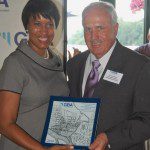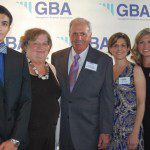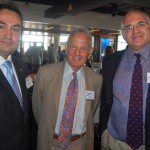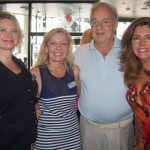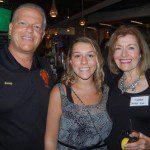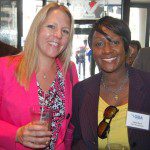Ron Swarthout Honored by GBA at Warm, Exuberant Luncheon
By • June 27, 2014 0 1869
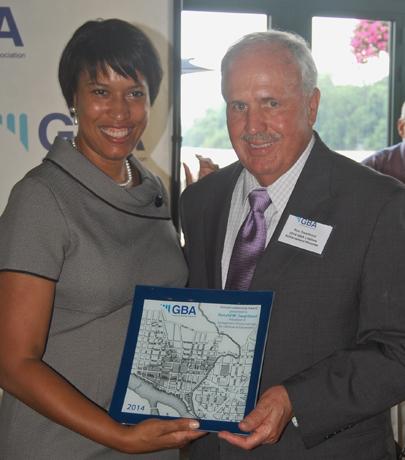
Sitting at a table for the 2014 Georgetown Business Association’s annual Leadership Luncheon at Tony and Joe’s Seafood Place at Washington Harbour, you could be forgiven if you felt a little blessed in this company of people who own or run businesses in Georgetown, in the company of fellow media types and your co-workers, in the company of local Washington political leaders.
You could see the Watergate, the Kennedy Center and the Potomac River flowing by and be pretty sure that you’re in the land of the high-powered.
But if truth be told, the luncheon was something a little better than that. It was hometown, happy and exuberant. It felt like a celebration of a community and a city all at once, and a celebration of small business entrepreneurship of the classiest kind, as embodied by the recipient of the 2014 GBA Lifetime Achievement Award Ron Swarthout of Georgetown Floorcoverings, which is celebrating its 60th anniversary.
All sorts of people were there, including representatives of the presenting sponsors Long & Foster of Georgetown, and sponsors like Friends of Hexagon, Georgetown Exxon & Georgetown Shell, The Georgetowner, and the Swarthout family, as well as GBA leaders like President Riyad Said, Vice President Janine Schoonover, Secretary Molly Quigley and Treasurer Karen Ohri, daughter of the honoree.
Some political leaders of this city were there, to honor the city, the community and Swarthout. There was a certain amount of celebratory swagger there, in the sense that there was a celebration of a booming city, a treasured, changing community that went beyond center-of-the-world braggadocio.
Muriel Bowser, the Ward 4 Councilmember and the Democratic candidate for mayor, was there, touting basically all the ways Washington was becoming a top-tier city in the eyes of the country and, yes, the world. Bowser, confident and assured, touted the city she will very likely, in the eyes of many, be running, if she can hold back two Independent challengers: at-large councilmember David Catania as well as former and long-time council member Carol Schwartz, who recently announced that she would be running.
Politics may have been a table-talk subject, but it wasn’t all that evident on the dais, where Bowser talked about Washington’s status as a go-to city for new residents, millennials, businesses and developers. “We are leaders in new construction, in fittest residents, in entrepreneurship, in visitors and as a vacation destination, in college graduates and as a technology hot spot,” Bowser said
Ward 2 Councilmember Jack Evans, one of the candidates whom Bowser defeated in the Democratic primary, recalled Georgetown and the city when things weren’t quite so economically sunny. “We had manholes blowing up,” he recalled. “You’d be walking down the street, and boom. Look where we are now.”
Yet both Bowser and Evans along with others were there to honor Swarthout, who was the very model of the kind of businessman who isn’t into bragging, beating his chest or taking all the credit. He succeeded his father, and his daughter, Karen bought the business in which he is still daily involved. “This was and is a family business all along,” he said. “It’s not I like I did this myself,” he said. “I had a lot of help. The people who worked here, steady as you go. The family, the community that made us welcome. And the residents here. Our customers, most important of all. Business serve their customers, and our customers are here. It’s like people say, it’s not about you.”
“It’s about helping people,” Swarthout told us earlier during a Georgetowner interview. “It’s about being proud of how you do the work and gaining people’s trust.”
You see the idea of community in his words and at the GBA leadership luncheon we attended, the community we work and live in, part of a great city to be sure. But you see the connections by looking at Swarthout at the Swarthout family table: wife, children, grandchildren and one great grandchild, by last count. You see the connections, reaching out into the village to include customers, the K Street location, the bridge overhead, and you hear the voices of the political leaders who in the best of times help create economic change, which means social and cultural change, which means the identity of a city.
You could find it all at a lunch: hot summer day, surf and turf on the plate with Key lime pie, gossip and news murmurs around the tables. You saw the accomplishments of change and the intimacy of people working together, the human parts interacting.
- Democratic candidate for mayor Muriel Bowser and leadership honoree Ron Swarthout. | Robert Devaney
- Nico Dodd

